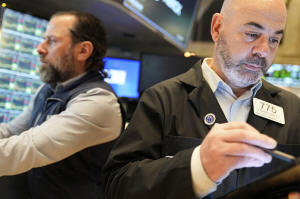US stocks dive after another stunning reversal as uncertainty reigns
about Trump's tariffs
[April 09, 2025] By
STAN CHOE
NEW YORK (AP) — U.S. stocks dove Tuesday following another stunning
reversal, with Wall Street veering from a huge gain at the opening of
trading to more losses at the close, because investors still have no
idea what to make of President Donald Trump’s trade war, which is
scheduled to kick into a higher gear after midnight.
After blasting to an early gain of 4.1%, which would have marked its
best day in years, the S&P 500 quickly lost all of it. It then careened
to a loss of 3% before paring its drop to 1.6%. That left the index,
which sits at the heart of many investors’ 401(k) accounts, nearly 19%
below its record set in February.
The Dow Jones Industrial Average lost 320 points, or 0.8%, after erasing
an earlier surge of 1,460 points, while the Nasdaq composite dropped
2.1%.
The shocking swings followed rallies for stocks globally earlier in the
day, with indexes up 6% in Tokyo, 2.5% in Paris and 1.6% in Shanghai.
But even after those jumps, analysts had been warning to expect more
swings up and down for financial markets not just in the days ahead but
also the hours.
The big question remains centered on how long Trump will keep his stiff
tariffs on other countries, which would raise prices for U.S. shoppers
and slow the economy. If they last a long time, economists and investors
expect them to cause a recession. But if Trump lowers them through
negotiations relatively quickly, the worst-case scenario can be avoided.

Hope still remains on Wall Street that negotiations may be possible,
which helped drive the morning’s rally. Trump said Tuesday that a
conversation with South Korea’s acting president helped them reach the
“confines and probability of a great DEAL for both countries.”
“Their top TEAM is on a plane heading to the U.S., and things are
looking good,” Trump said on his Truth Social platform. “We are likewise
dealing with many other countries, all of whom want to make a deal with
the United States.”
Japanese stocks led global markets higher after the country’s prime
minister, Shigeru Ishiba, appointed his trade negotiator for talks with
the United States. It was based on an agreement between Ishiba and
Trump, Japanese officials said.
But investors should still remain cautious, said Sameer Samana, a senior
global market strategist for Wells Fargo Investment Institute. He
pointed to how “the key countries continue to escalate, rather than
de-escalate.”
China said it will “fight to the end” and warned of countermeasures
after Trump threatened on Monday to raise his tariffs even further on
the world’s second-largest economy.
White House press secretary Karoline Leavitt then said Tuesday that
Trump’s threats of even higher tariffs on China will become reality
after midnight, when imports from China will be taxed at a stunning 104%
rate.
[to top of second column] |

Federico DeMarco works on the floor at the New York Stock Exchange
in New York, Tuesday, April 8, 2025. (AP Photo/Seth Wenig)
 That would coincide with Trump’s
latest set of broad tariffs, which are scheduled to kick in at 12:01
a.m. And Trump has made clear that he does not intend to have any
exemptions or exclusions in the tariffs, according to the country’s
top trade negotiator, Jamieson Greer.
The U.S. trade representative also said in testimony before a Senate
committee that roughly 50 countries have already been in contact,
and he’s told them: “If you have a better idea to achieve
reciprocity and to get our trade deficit down, we want to talk with
you, we want to negotiate with you.”
Trump’s trade war is an attack on the globalization that’s shaped
the world’s economy and helped bring down prices for products on
store shelves but also caused manufacturing jobs to leave for other
countries. Trump has said he wants to narrow trade deficits, which
measure how much more the United States imports from other countries
than it sends to them as exports.
On Wall Street, companies with vast supply chains around the world
helped lead the losses. Ralph Lauren sank 5.6%, for example. It
sourced about 15% of its products from China last fiscal year.
Best Buy doesn’t import many products directly from China, but the
electronics industry in general has a supply chain that heavily
depends on the country. Best Buy estimates vendor imports from China
make up about 55% of the products it purchases, and the retailer’s
stock fell 8.3%
On the winning side of Wall Street were health insurers, which rose
after the Centers for Medicare & Medicaid Services announced a
stronger-than-expected increase in Medicare Advantage payments for
next year. Humana jumped 10.7%, and United Health climbed 5.4%.
All told, the S&P 500 lost 79.48 points to 4,982.77. The Dow Jones
Industrial Average dropped 320.01 to 37,645.59, and the Nasdaq
composite sank 335.35 to 15,267.91.

In the bond market, longer-term Treasury yields rose for a second
straight day to recover more of their sharp losses from prior
months. The yield on the 10-year Treasury climbed to 4.27% from
4.15% late Monday and from just 4.01% late Friday.
Yields tend to rise with expectations for the U.S. economy’s
strength and for inflation. ___ AP Business Writers Matt Ott and
Elaine Kurtenbach contributed.
All contents © copyright 2025 Associated Press. All rights reserved |